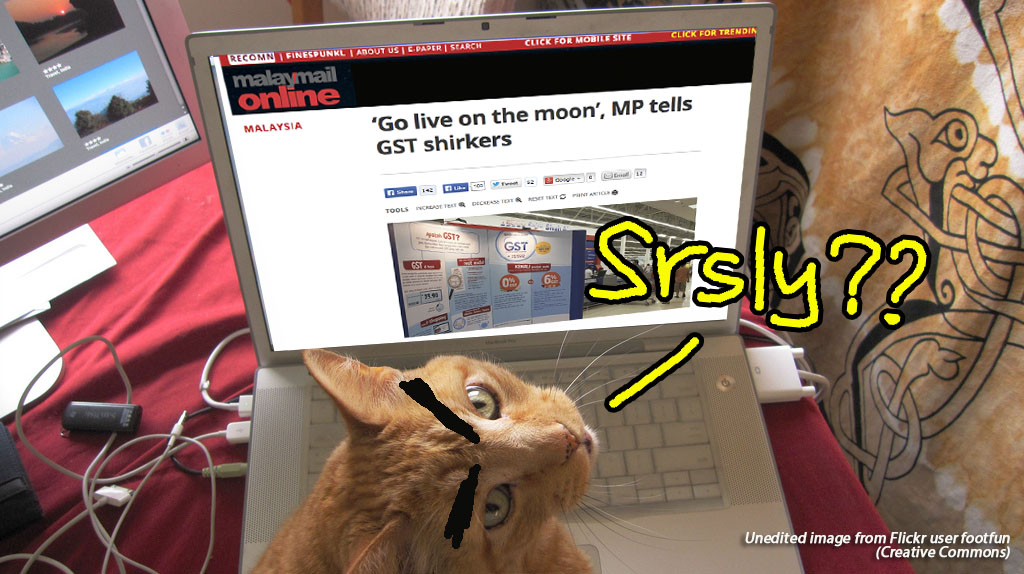This company makes chicken BACON? How did they get past JAKIM??!
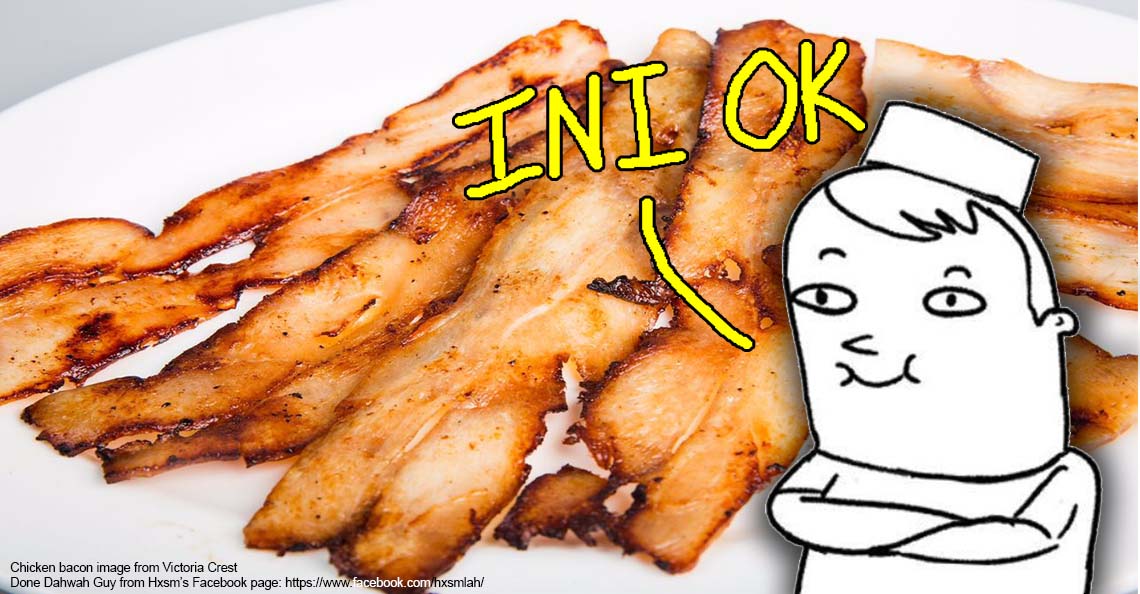
- 2.6KShares
- Facebook2.5K
- Twitter11
- Email28
- WhatsApp86
Malaysia made the international headlines again this week, but this time over something that’s completely unrelated to 1MDB or Jalur Gemilang underwear. It’s over the fact that JAKIM has “banned” the use of the word Hotdog because it might confuse Muslims into thinking that it’s associated with actual dogs.
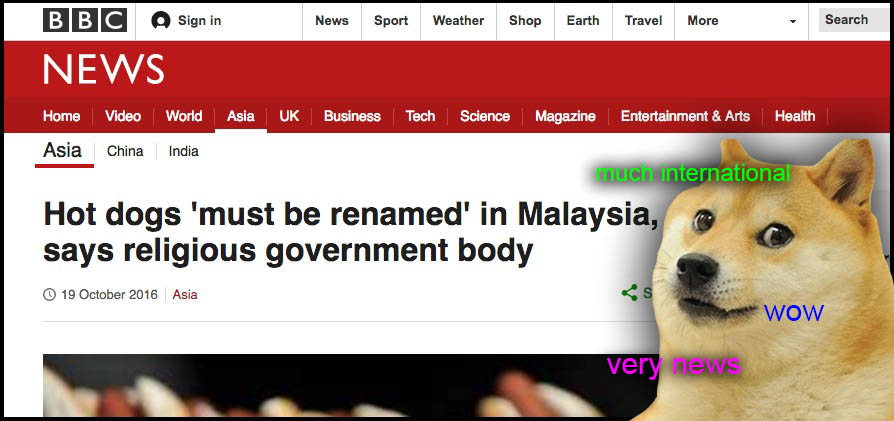
And over on social media, JAKIM became the subject of much sarcasm over their allergy to logic:
Malam ni nak sembahyang tapi tak boleh sebab dalam takbir ada ‘bir’ 🙁
Macam mane JAKIM?
— Haikal Idris (@haikalclassic) October 19, 2016
So here’s a quick recap of what happened. The brouhaharam started because of a post from Farhatul Kamilah, the Quality Assurance/Halal executive at popular pretzel chain Auntie Anne’s, explaining why JAKIM rejected their application for Halal certification. According to the post (which you can read here), the reasons were:
- JAKIM asked them to submit an application to certify their Central Kitchen (basically where everything’s made) before applying for their individual outlets
- JAKIM asked the executive to submit individual applications for each outlet according to zones to make auditing easier. She initially submitted all 45 outlets under one application.
- JAKIM requested that they change the name of their “Pretzel Dog” product to something more appropriate
Unfortunately when this reached the news and social media, all everyone saw from the post was:
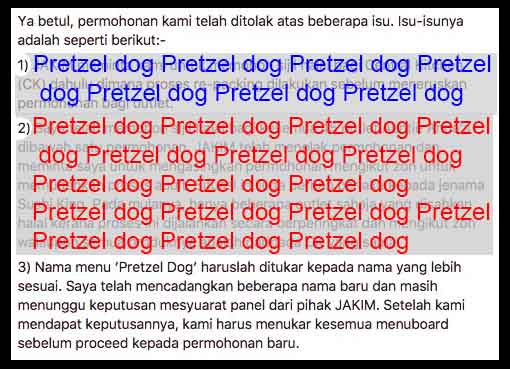
So, to be fair to both Auntie Anne’s and JAKIM, we decided to not point fingers and instead reach out to a third party that has already received JAKIM’s Halal Certification to see if there’s a valid reason for JAKIM to get in a twist (sbb pretzels, geddit?). We reached out to Victoria Crest, a company that specializes in Halal meat products like gourmet sausages, and chicken bacon streaky. So let’s start with the main question – will Muslims be confused by the word “dog”?
Muslims might actually get confused – but not because they think hotdogs contain dogs
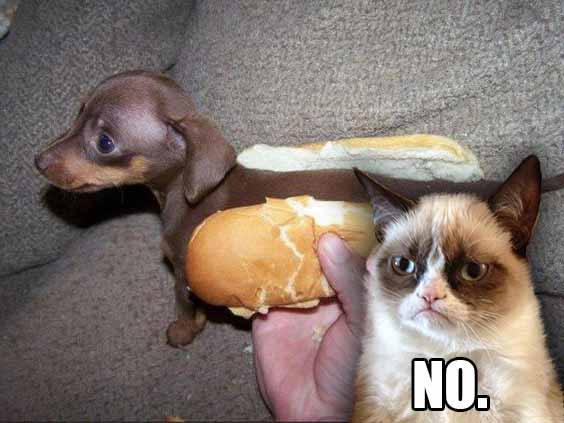
We met with En. Fazly, chairman of Victoria Crest’s Halal Compliance Committee (Read more on what that is in our previous article) and he tells us that JAKIM actually has a written rule against halal-lizing (we made that up) certain words that are completely non-halal to begin with:
“…products which use the name or synonymous names with nonhalal products or confusing terms such as ham, bak kut teh, bacon, beer, rum, hotdog, charsiew and the like;” – Quoted from JAKIM’s Manual Procedure for Malaysia Halal Certification, pg 16.
En. Fazly says that the logic behind this rule is that the confusion comes from the definition of the words. “Bacon” for example is defined as “Thin strips of salted and smoked meat from the back and sides of a pig” so when you have stuff like “chicken bacon” or “beef bacon” it just means that you’ve used a different kind of halal meat to resemble bacon.
“My personal point of view is that you can’t call a product with the words “bacon” or “ham” halal because it’s not, and it’s going to be confusing. Our company policy is that if there’s a chance the words will confuse people, we’ll change it. We market our chicken bacon as chicken streaky because that’s what it is – streaks of meat.” – En. Fazly
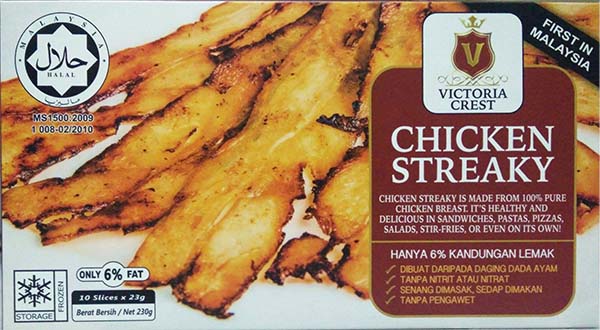
The problem arises because many Malaysians are so used to halal versions of bacon that they associate bacon with “strips or streaks of meat”:
“It depends on the background of the consumer. When we approached some Malay customers at burger shops and such with the chicken streaky, they didn’t understand the product. It wasn’t until we said the word “bacon” that they understood it, because they think “bacon” refers to the [strips].” – En. Fazly
This is why he thinks that JAKIM is seeing this from the consumer’s point of view, that because it’s almost commonplace to order “bacon” in Malaysia and get chicken or beef bacon, Malaysian Muslims (especially non-urbanites) may go overseas and order bacon without realizing that they would be ordering pork.
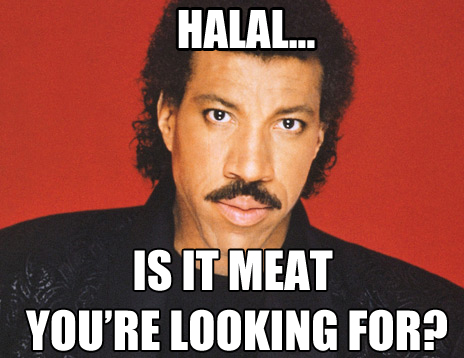
Similarly, he thinks that the reason why hotdogs are in the list isn’t because JAKIM is afraid that Muslims might think it contains actual dog or because dogs are haram, but rather that hotdogs overseas are traditionally made from beef or, you guessed it, pork.
“The actual definition of a hotdog is “a sausage served in a sliced bun” and not “chicken sausage”. A lot of hotdogs are from America are beef for Kosher reasons, but they’re made from pork as well.” – En. Fazly
So again, it’s because a Muslim going to New York for the first time may unknowingly buy a pork hotdog or, with the influx of imported foods, accidentally pick up a pack of imported pork sausages because the packaging says “Hotdogs”. In fact, a recent statement by Datuk Seri Jamil Khor Baharom, the minister in charge of JAKIM, also points to this conclusion:
“What matters for us is the ingredients, not the name. That is the priority. I too have had hotdogs. There is no question of us wanting to ban or making hotdogs haram,” – Jamal Khir Baharom, as quoted by The Malay Mail Online.
So now that we’ve got this covered let’s move on to the other two reasons why JAKIM rejected Auntie Anne’s Halal certification…
JAKIM’s certification isn’t just religious, it’s also to create higher food standards
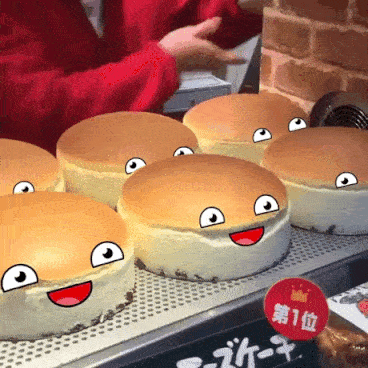
Okay, first up, we’re not accusing Auntie Anne’s of any dodgy food business – they actually have Halal certification from the IFRC, another Halal certification body.
The backstory of this is because although we see JAKIM and Halal compliance going hand-in-hand like sausages to buns, it wasn’t always the case. While Malaysia has been working on our Halal standards and requirements since 1974, the certification and compliance was done by various agencies till it was fully consolidated under JAKIM in July 2009, making their Halal logo the only recognized one in the country.
Victoria Crest applied for their Halal cert in January 2010 and received it in April that same year, making the company one of JAKIM’s first batch of “customers,” so to speak. En. Fazly tells us that he was the person who applied for and maintained the Halal cert “since day one” and has seen JAKIM evolve and improve on their standards over the years, since every company must be audited with a factory inspection in order to renew their license (every 2 years):
“Personally, I think JAKIM is doing a good job. Most people assume their audits are only for religious reasons, like making sure there’s no pork, but it’s actually very similar to ISO and HACCP standards for food quality. They will pick up on cleanliness, manufacturing practices, delivery to the supermarkets – even pointing out places where they see cobwebs! And to making sure everything is halal-compliant, of course.
Oh, I should also mention that when we first got the cert, JAKIM actually came to check up on us more than once to ensure we were keeping up to standards” – En. Fazly
That ISO and HACCP thing En. Fazly mentioned are basically an international standard of best practices which means that a certified product is recognized as meeting quality standards anywhere in the world. In other words, what En Fazly is saying is that JAKIM’s halal logo isn’t just a sign that a product is halal, but also that it’s keeping to a high level of cleanliness and quality. Of course, we should add that the company is ISO and HACCP certified too 😉
“We’re very proud of our JAKIM halal certification because it means our customers are not only ensured that it’s halal tanpa was-was but also that it’s made with the highest standards, which is why we intend to continue working closely with JAKIM tanpa was-was.” – En. Fazly.
So bringing this back to Auntie Anne’s, this is most likely the reason why JAKIM asked to get their Central Kitchen certified first, since that’s the starting point where the food is going to be made before being sent out to the individual branches. As to why each individual branch needs to be certified, well…
JAKIM wants you to get quality food without kacau-ing businesses too much
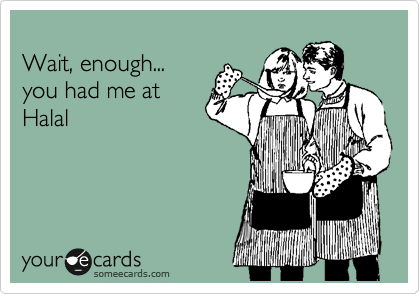
As it turns out, the owners of Victoria Crest have plans to open hotdog kiosks called Pondok Sosej (not Pondok Hotdog, okay) that uses their own halal sausages; so we kinda approached them at the right time since they’re already looking into this. 🙂
Compared to a business where the final product is wrapped up and opened by the customer, an eatery business is different since the food is prepared on the location. This means that JAKIM has to ensure that the product is certified all the way from the factory till it reaches the customer’s mouth. In this sense, different branches (or especially franchisees) may be tempted to cut corners or replace certain ingredients on their end with cheaper non-Halal compliant products; so an individual certification for each outlet would lower the odds of that happening.
At the same time, arranging to visit each outlet would be very time consuming (not to mention disruptive for the business) so JAKIM is looking to streamline the auditing process, which is why they asked Auntie Anne’s to not only submit an individual application for each outlet, but also to separate them into zones so that they can schedule their site visits by zones instead.
“It’s the same at our factory. Every Halal product [not just Victoria Crest] is per application, and we introduce new items pretty often. This means that we have 3-4 different certs which JAKIM has to audit over different times in a year. We spoke to them and came up with a way to streamline the process where they allowed us to accumulate multiple products under a single application to minimize the site visits.” – En. Fazly
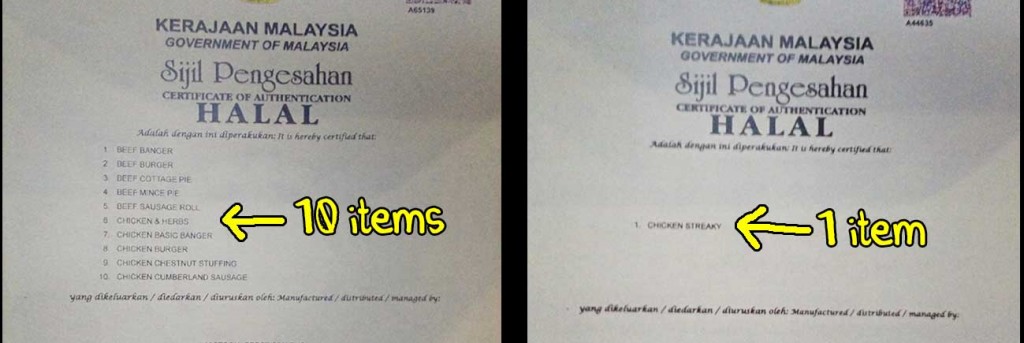
On top of all that, JAKIM has already stated that they are open to discussions with companies who want to maintain certain words for branding purposes. Though on that note, we wish they had the same openness to questions since they’ve never responded to our questions for articles. Just sayin’.
But waaaaait… hasn’t JAKIM shut down companies over halal issues before? What about Cadbury??!
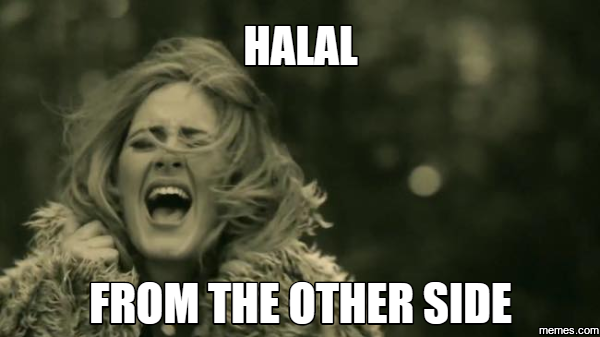
Some of you might remember the Cadbury pig DNA “ban” in 2014, where JAKIM withdrew Cadbury’s halal status over pig DNA samples found in some samples and got major flak for overreacting (again). However, the calls for bans and shutdowns actually came from NGOs. JAKIM temporarily withdrew halal certification for the affected products, which was reinstated after further investigation found that Cadbury was in the clear.
This article may sound like we’re trying to justify JAKIM’s actions, but it’s more of looking at the full picture AND remembering that the Halal division is only one of the departments under JAKIM and they seem to be doing a pretty decent job – Halal-wise at least. In fact, Malaysia’s Halal standards are recognized as being one of the best in the world, and JAKIM’s halal logo is so well accepted and recognized overseas that some manufacturers in China have been caught illegally sticking them on their products to increase sales.
While it’s true that their processes and guidelines aren’t perfect, it’s also evident (from En. Fazly’s experience, anyways) that they’re trying to improve them to maintain that edge that Malaysia has in the halal industry. This isn’t just for religious reasons, but also economical – the global halal industry is estimated to be worth US$2.77 TRILLION a year, with Malaysia getting a US$9 billion (RM37.7 billion) slice of the dijamin halal pie in 2014.
Although it’s easy to ridicule JAKIM over this hotdog issue, a closer look at the whole story brings up two serious questions that we have to ask ourselves. The first is, was it JAKIM or us who overreacted over this hot dog thing, and the second (perhaps more important) question is that – despite their best intentions of keeping Muslims safe from anything haram – would education be a better alternative? As former Malaysian Insider editor Jahabar Sadiq pointed out in his article on the issue, most Muslims know the difference between beer and root beer, so are these rulings actually detrimental in the long run since it further isolates them from a world outside Malaysia where the halal and non-halal aren’t as clear cut?
P.S.: For full disclosure as well as a plug to thank Victoria Crest for layan-ing our questions, they’ve donated products for a CILISOS BBQ and everything was delicious. Writer’s personal recommendation is the Lamb and Beef Merguez, found in all major supermarkets 😛
- 2.6KShares
- Facebook2.5K
- Twitter11
- Email28
- WhatsApp86

